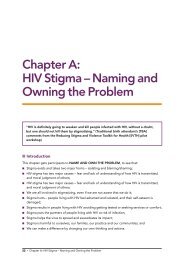Implementing Multiple Gender Strategies to Improve HIV and ... - ICRW
Implementing Multiple Gender Strategies to Improve HIV and ... - ICRW
Implementing Multiple Gender Strategies to Improve HIV and ... - ICRW
You also want an ePaper? Increase the reach of your titles
YUMPU automatically turns print PDFs into web optimized ePapers that Google loves.
seminars with invited guest speakers on <strong>to</strong>pics including <strong>HIV</strong> <strong>and</strong> AIDS,<br />
prevention of mother-<strong>to</strong>-child transmission (PMTCT), voluntary <strong>HIV</strong><br />
counseling <strong>and</strong> testing, the role of nutrition in <strong>HIV</strong> management, drug <strong>and</strong><br />
substance abuse, relationships, child rights, violence against women, vital<br />
registration <strong>and</strong> documentation, <strong>and</strong> business management.<br />
Adolescent girls <strong>and</strong> young women accessed loans through the group<br />
lending scheme <strong>and</strong> started businesses <strong>to</strong> increase their income. By<br />
earning <strong>and</strong> saving, as well as through the female men<strong>to</strong>rship provided by<br />
the program, participants were empowered <strong>to</strong> resist sexual coercion, insist<br />
on condom use <strong>and</strong> refuse sex. Through workshops <strong>and</strong> group meetings,<br />
participants also were informed about gender-based violence <strong>and</strong><br />
sensitized on their legal rights.<br />
When the project was introduced, some community members raised<br />
concerns about the choice <strong>to</strong> focus only on girls. The community felt there<br />
was also a need <strong>to</strong> equip boys with information on <strong>HIV</strong>. In response, three<br />
male-only groups were formed, which addressed male norms <strong>and</strong><br />
behaviors, including sexual coercion, gender-based violence, condom<br />
negotiation, <strong>and</strong> perceptions around <strong>HIV</strong> risk <strong>and</strong> risky behavior.<br />
Target Audience<br />
Adolescent girls <strong>and</strong> female youth, ages 16–22, living in low-income areas<br />
of Nairobi<br />
Level of Intervention<br />
District<br />
Geographic<br />
Location<br />
Nairobi<br />
Timeframe June 2001 – May 2004<br />
Funders • K-Rep Development Agency (KDA)<br />
• Ford Foundation<br />
• UK Department for International Development (DFID)<br />
Partner<br />
Organizations<br />
Implementation partners:<br />
• K-Rep Development Agency (KDA)<br />
• Community churches, schools <strong>and</strong> government officers, such as chiefs<br />
Evaluation partners:<br />
• Population Council staff from Nairobi <strong>and</strong> New York<br />
• K-Rep Development Agency (KDA) staff<br />
• External consultants<br />
70
















